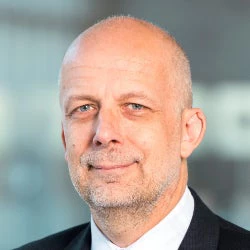 Frontline health care workers at Ga East District Hospital in Ghana. © Enoch Oti Agyekum / World Bank
Frontline health care workers at Ga East District Hospital in Ghana. © Enoch Oti Agyekum / World Bank
December 12 marks the International Universal Health Coverage (UHC) Day. This year’s theme “protect everyone” cannot be more relevant amidst the global COVID-19 (coronavirus) pandemic.
UHC and preparedness are two sides of the same coin
UHC is the frontline defense for picking up and responding to unusual illnesses in communities, building trust in health systems, and safeguarding the continuity of essential health services for everyone without impoverishing cost to households.
UHC directly contributes to reducing poverty by removing financial barriers to essential care. COVID-19 threatens to push as many as 150 million people into extreme poverty by 2021, costing countries trillions of dollars for response and recovery. The pandemic has laid bare the fragility of health systems around the world, and as the global recession threatens to deepen, there is an even greater risk of a widening equity gap.
UHC is an investment in building human capital . Early estimates suggest that child mortality could rise by 45% with health services curtailed and less access to food. As part of ongoing monitoring efforts, recent Global Financing Facility for Women, Children and Adolescents (GFF) and World Bank analysis show that on average about 40% of foregone care is due to financial barriers, making access to lifesaving services, such as antenatal visits, vaccinations, and outpatient consultations, out of reach. Earlier evidence on service disruptions coupled with this news confirm early warnings that secondary health impacts caused by COVID-19 are putting at risk many years of hard-fought gains in women’s and children’s health and nutrition. Fully aligned with and complementing the World Bank response, the GFF has been supporting its 36 partner countries to protect and promote the continuation of essential health services for women, children and adolescents.
An opportunity to build back better
On the other hand, this global crisis opens up tremendous opportunities to build back better and accelerate progress towards UHC. Several lower-income countries have been responding swiftly and effectively to COVID-19.
Sierra Leone, with its experience of the devastating Ebola outbreak in 2014-2015, swiftly activated the national emergency coordination mechanism and posed mandatory quarantine on travelers a month before the first in-country COVID-19 case. This year, Sierra Leone celebrates UHC Day with the launch of its UHC Roadmap, providing strategic direction for UHC by 2030. Prone to multiple infectious diseases, the country plans to integrate emergency preparedness and response into health systems strengthening towards achieving UHC. The World Bank-supported Ebola Emergency Response Project, Health Service Delivery and System Support Project and the Regional Disease Surveillance Systems Enhancement (REDISSE) Project have laid a foundation for Sierra Leone’s effective response to COVID-19. The World Bank also mobilized a COVID-19 emergency preparedness and response project within days of the first in-country COVID-19 case.
Ghana has taken the unprecedented crisis as an opportunity to address the widening systemic inequities by creating stronger social and financial safety nets, fulfilling the needs of persons with disabilities, survivors of gender-based violence, and migrants. Equity has been a long-standing priority for Ghana through its flagship Community-based Health Planning and Services (CHPS) Program with support from the World Bank and other development partners. The World Bank is further contributing to strengthening primary health care for continuity of routine essential services, which were severely disrupted in the first half of 2020, and enhancing preparedness for COVID-19 vaccine deployment.
Leadership matters
UHC ultimately requires a political commitment. Evidence, economics and moral arguments are important but do not deliver alone. The World Bank, together with the WHO, co-convenes UHC2030, a multi-stakeholder platform advocating for UHC. It brings together governments, multilateral health agencies, foundations, civil society, and the private sector. UHC2030’s six UHC Key Asks contributed to enhancing the political momentum behind the UHC High-Level Meeting and its resulting Political Declaration in 2019, which strengthened the commitment of country leaders to achieve UHC by 2030.
UHC2030 has just issued its first State of UHC Commitment report together with country dashboard to keep political commitments alive in the COVID-19 context. The report builds on the above six asks and concludes with a call to eight actions by leaders and other stakeholders across society that would protect everyone.
Strengthening primary health care systems is smart investment not only in responding to the pandemic, but also for ensuring the delivery of essential services to protect everyone. The World Bank is placing primary health care at the center of its support to developing countries, as the foundation for achieving UHC.
Countries need innovative revenue generation strategies
COVID-19’s economic impact is straining government revenues. Without action, public expenditure on health is expected to decline by more than 5% on average globally. This is an opportunity to consider innovative revenue generation strategies including pro health taxes on tobacco, alcohol, sugar sweetened beverages; reducing fossil fuel subsidies; and taxing carbon to generate revenue for more sustainable health systems.
We need to work together
The World Bank’s unprecedented COVID-19 emergency response support of up to $160 billion shows the Bank’s commitment to supporting developing countries and partnerships including with UHC2030, SDG3 Global Action Plan, GPMB, ACT-A, and other international finance institutions are an essential part of our work.
On this UHC Day, there is nothing more universal than the need for global pandemic preparedness. No one is safe until all are safe, and everyone is protected through universal health coverage.



Join the Conversation